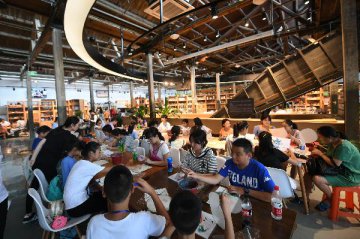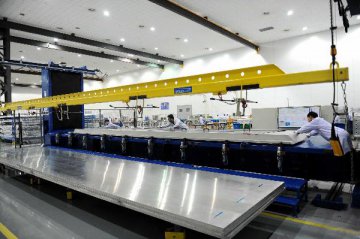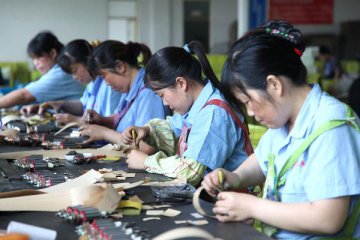
“China has broken away from the model relying on labor intensive industries and will depend on automation more.” Nobel Prize Winner Christopher Pissarides indicated in a media press recently. He was impressed by the technology progress in China.
China’s best-known robots are widely known in the world.”
China’s “intelligent manufacturing” is a hot topic in the prospects for 2018 released by major foreign-funded institutes. Some economists believe that the upgrading of technology will promote the high-quality development of China’s economy. Despite the de-leveraging, China’s economy will maintain stable growth thanks to the transformation of the growth model.
De-leveraging to gradually change growth drivers
To curb high leverages and prevent risks in the financial market, financial regulatory authorities have released policies on interbank and off-balance businesses since the beginning of the year. The statistics released by the central bank last Friday show that social fundraising reached 1.14 trillion yuan last December, decreasing 499.9 billion yuan year on year. The M2 balance increased 8.2 percent, which is 0.9 percent and 3.1 percent lower than the end of the previous month and the same period of last year. It means that the de-leveraging is deepening.
Economists with foreign-funded institutes believe that the progress will continue this year. De-leveraging improved the profit of state-owned enterprises (SOEs), manufacturing enterprises in particular, said Zhou Hao, an economist at Commerzbank.
Under the background of de-leveraging, the so-called “credit impulse”, the proportion of new credit in GDP, has been at a low level. Insiders worried that it will affect the economic growth.
However, Zhou indicated that the declining “credit impulse” means that the credit is playing a less important role in supporting economic growth. The credit may keep at a high level and the GDP growth will be stable, which shows that the economic structure is transforming.
The effects of the declining “credit impulse” on the economy is under control and the quality of China’s economic growth will be further improved, said Robin Xing, Morgan Stanley’s chief China economist. It is attributed to the improved exports and higher contribution of net exports in the overall GDP. As for internal growth drivers, the economic growth will reduce its dependence on credit. Compared with the period from 2013 to 2016, the property market is unlikely to see deep adjustment due to declining credit.
Nobel Prize Winner Eric Maskin suggested that it is useful for Chinese enterprises turning debts into equities. He believed that many debts in China are held by the government or SOEs and they are not under danger.
Technology upgrading to promote high-quality development
The de-leveraging also attracted attention from foreign-funded institutes on China’s policies. Xing believed that as the low interest rate will not benefit de-leveraging, the central bank may raise the interest rate from the third quarter.
China’s interest rate will keep a marginal level, indicated UBS Securities China strategist Gao Ting. If overseas countries raise interest rate, it may increase the pressure on interest rate hike, but it is not a compulsory option.
Macro policies should consider the technology transformation and upgrading in private economy, said Qu Hongbin, Chief Economist for Greater China at HSBC. It requires monetary policies returning neutral and proactive fiscal policies will focus on reducing the taxes and fees of enterprises. As a result, it can create a more favorable environment for private economy.
Qu estimated that China’s economic growth will keep stable and private economy is the new hope. The manufacturing industry has completed de-leveraging and initiated a new cycle of technology transformation and upgrading. The new cycle is the hope for the high-quality development of China’s economy.
Based on the prospects released by the Vintage, the biggest common fund in the world, decision-makers have necessary tools and flexibility in dealing with the economic downwardness. Besides, the transformation of China’s economic growth model will reduce the downward pressure on slowing fixed asset investments and industries with high leverages. Under such background, China’s economic growth is more likely to beat the expectation.
Aberdeen Standard Investments believed that China will lay solid foundations for long-term economic growth if it implements the economic reform.
It will also contribute to the global economy. “The consumption has been outstanding in recent year. The trade in Asia is better than other regions. It means that China may initiate this round of global economic recovery,” Zhou said.
Translated by Star Zhang
























Latest comments